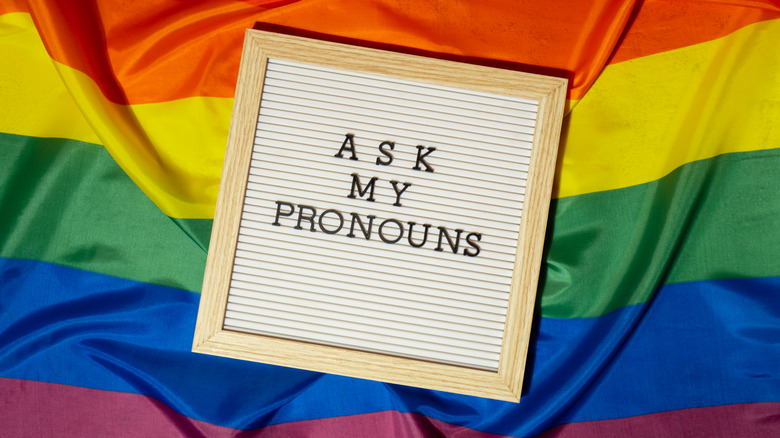How To React Respectfully If You Accidentally Misgender Someone
For people whose appearance conforms to the sex they were assigned at birth, the thought of having someone second-guess their gender or call them by the wrong pronouns probably doesn't even come across as a second thought. However, trans, non-binary, and gender non-conforming people often deal with this on a regular basis. Misgendering, the process of referring to someone with the wrong pronouns or honorifics, is not only an annoying and exhausting experience to deal with; it's also legitimately harmful. Research from 2018 published in APA PsycNet found that people who experienced misgendering reported dealing with frequent anxiety and depression.
As Mary Emily O'Hara, a communications officer at GLAAD explains to NPR, pronouns are a way through which we identify ourselves and they can be crucial to a trans person's identity. Whether or not it's intentional, referring to someone by the incorrect pronouns communicates to that person you are perceiving them as someone they are not. This can be harmful and invalidating to their experience. Still, even the most well-meaning allies can make mistakes. Part of practicing allyship responsibly is working on being better and correcting these behavior. Here is how you can be respectful if you accidentally misgender someone.
Do not center yourself
It's true that even after being told someone's pronouns, mistakes can happen. However, no matter how often it occurs, it's important to acknowledge your mistake each time, even if it's by simply interrupting your speech to apologize and correct yourself mid sentence.
Whatever you do, do not sweep it under the rug and pretend like it didn't happen. Yes, it may be uncomfortable for you, but imagine how hurtful it can be for a trans or non-binary person. The worst thing you can do if you accidentally misgender someone is make it about yourself or be defensive. Do not continuously state how sorry you are and how much you didn't mean to misgender them. Avoid phrases like "I am so sorry, this never happens" or "I am an ally, I promise." It's already awkward and damaging enough for trans people to have their gender identity invalidated, and these statements read as if one is asking for forgiveness that is not automatically owed. The last thing a person needs is you dwelling on the situation for too long by making it about your feelings.
Educate yourself on gender and LGBTQ+ issues
Correcting your individual actions in the moment is important, but equally vital is continuing to educate yourself on gender and other LGBTQ+ experiences. There are many gender identities that go beyond male, female, or nonbinary. Some people are agender, pangender, or genderqueer. Moreover, just because someone identifies as non-binary, it does not mean that they use they/them pronouns.
Beyond educating yourself, it's important to use your voice to speak out against anti-LGBTQ+ violence and discrimination, including misgendering. When you hear or see other people misgendering someone, do not stay silent. Correct them in a friendly and respectful manner. This helps take the burden away from transgender people. Correctly calling someone by their name is an act of respect and visibility, of seeing someone for who they are, without invalidating their experiences. When mistakes occur, acknowledge them, apologize, correct yourself and move on. By being respectful you create a more trans-inclusive space for everyone.
Normalize using gender-neutral language in your everyday life
Asking for someone's pronouns is one of the most respectful approaches to avoiding misgendering in the first place. However, be mindful of the situation you are in, because asking for pronouns means trans people may have to forcefully come out to you. Not everyone is comfortable being out, so make sure you analyze the situation before asking. In work setting, for instance, avoid going around the room and putting people on the spot to share. If you are a cisgender person, you can create a safe space for gender diverse people by stating your pronouns even if nobody asks you. Once you know a person's pronouns, use them correctly.
While opting for gender neutral pronouns is a safe option on the first meeting with someone you do not know well, it's important to be respectful of someone who tells you they prefer gendered choices like he/him or she/her pronouns. Moreover, be mindful that pronouns do not equal a person's gender identity, and that some people use more than one pronoun. Again, always ask which one they prefer and if they have no preference, alternate between all of them. And if you've never met them, you can usually tell from social media bio as most people will tell you all the pronouns they are okay with.
The other way to avoid misgendering people is to modify your language. Using gender neutral pronouns in English is much more common than you think. You have probably already used they/them in conversation without realizing it. These are both widely considered inclusive and respectful terms that can be appropriate for talking about someone you don't know.



